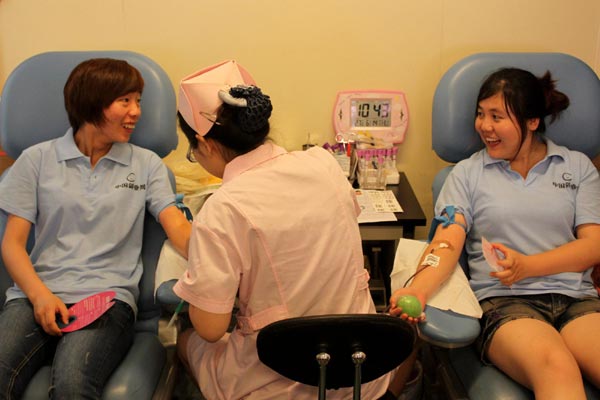 |
|
Two women donate blood in Hefei, East China's Anhui province, June 14, 2012. [Photo/Xinhua]
|
A chronic blood shortage has plagued the Hospital Affiliated to Inner Mongolia Medical University for almost a year, and at least 30 other blood disease patients are waiting for blood transfusions.
About 1 km from the hospital, on the busiest commercial street in downtown Hohhot, the regional capital, is a blood donation center that is open seven days a week to donors.
The obscure 10-square-meter room, however, receives little attention from the passing crowd. "We receive about 30 donors daily on weekdays and roughly 40 on weekends," said a medical worker at the center.
The number of blood donors is apparently too small compared with the hordes of citizens and tourists that pass by one of the most crowded areas in Hohhot every day, he said.
Liu, whose hemoglobin is only 30 percent of the normal level, needs at least 600 milliliters of blood, said Dr. Gao Da, a surgeon at the hospital. "Without an immediate transfusion, she may die from hemorrhage."
The blood shortage is forcing the hospital to postpone 20 to 30 operations daily, said Zheng Runtao, chief of the hospital's blood bank.
"The hospital needs 350,000 milliliters of blood a month, but gets only 260,000 milliliters," said Zheng.
The blood crisis has lasted for nearly a year since last July. "In the past, blood shortages were reported only during winter and summer, when college students, of whom the whole society relies for blood donations, were on holiday," said Zheng.
Nowadays, however, hospitals are almost always short of blood, she said.
In Hohhot alone, clinical blood supplies totaled 10,000 liters last year, 3,000 liters below the city's actual demands.
"Blood shortages are a national problem," said Li Ruijun, head of Inner Mongolia's blood center, an non-profit institution run by China Red Cross for blood collection and distribution.
He said the number of voluntarily donors is too small to meet the country's clinical demand.
Ministry of Health says blood donors take up only 0.9 percent of the Chinese population. According to the World Health Organization (WHO), however, at least 1 to 3 percent of the population should donate blood to meet a nation's basic demand for clinical blood.
WHO has chosen June 14 as the World Blood Donor Day to raise awareness of the need for safe blood and blood products and to thank voluntary unpaid blood donors for their life-saving donation.
In China, college students and soldiers at the People's Liberation Army and Armed Police Forces make up the bulk of voluntary blood donors.
Many big cities have mobile blood collection centers in downtown streets, with medical workers dispelling public fears of blood donation.
Still, chronic blood shortages are often reported from hospitals and nationwide blood centers.
To tackle the shortages, the blood center of Gansu province in northwest China is using microblogging services at five major social websites to ensure real-time communication for blood collection and supplies.
"Blood centers in different cities and counties post their demand and supplies online every day, so that surplus blood can be redistributed to the needy places faster," said Li Yongming, an official with the Gansu provincial blood center.
While many people fear the loss of blood might be harmful to their health, more than 20 percent of the voluntary donors are taken off the list every year for their own health problems such as hyperlipemia or hypertension, said Li.
"It's important to raise public awareness of the issue, particularly among the young and well-educated people," he said.
Inner Mongolia's regional blood center opens to the public every Thursday, showing how blood is collected, tested and stored to ensure safety. "But very few people come," said Li.
The blood center plans to step up publicity and draw more healthy citizens to donate blood, he said.
Meanwhile, the center waiting for the city government's approval to set up five to six mobile blood collection centers on downtown streets.
